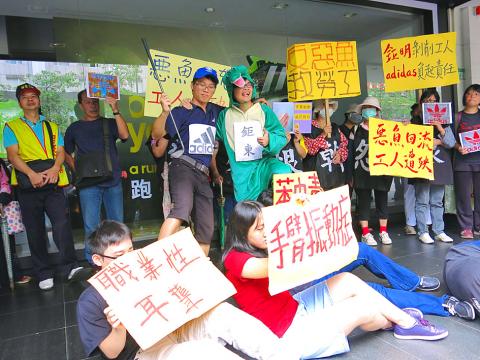Local labor groups urged sportswear giant Adidas yesterday to address poor working conditions at the factories of its Taiwanese suppliers in China, amid complaints of occupational diseases and health issues, such as benzene poisoning.
The activists pressed their calls in front of Adidas’ flagship store in Taipei in a protest that was part of a movement jointly launched by labor activists in Taiwan, China, Hong Kong and Indonesia, the protesters said.
Their primary target was Dynamic Precision Industry Corp (鉅明), a Taiwanese supplier that produced golf clubs for Adidas at its factory in Guangzhou, China, before recently shutting down its production line.

Photo: CNA
The activists accused the company of having maintained poor working conditions at the Guangzhou plant, which they said affected about 100 workers.
Some of them went deaf, while others have experienced benzene poisoning, or developed pneumoconiosis or hand-arm vibration syndrome, the activists said.
The Guangzhou plant’s management responded to the health complaints by laying off the workers and paying them severance, the activists alleged.
Those who refused to leave their jobs were pressured into doing so when the company cut their wages and eventually halted production, they said.
The protesters also expressed their opposition to Dynamic Precision Industry’s plan to move back to Taiwan, shouting the slogan: “Bad fish swims back, victimizing workers in Taiwan.”
Workers at another Taiwanese factory in China that makes goods for Adidas also came down with benzene poisoning, and one of them died in March, the activists said.
They called on Adidas to meet its social responsibilities by improving working conditions at its contract manufacturers and opening itself to supervision by labor groups.
They demanded that Adidas properly compensate the six workers from Dynamic Precision Industry with hand-arm vibration syndrome and see to it that workers suffering from benzene poisoning receive immediate treatment.
Lin Fan-shun (林凡舜), a public relations manager at Adidas, accepted a petition presented by the labor groups, but said he was not authorized to comment on the complaints because they involved manufacturers in China.
Lin also declined to respond positively to the activists’ request for a reply to their demands within five days.

PATENTS: MediaTek Inc said it would not comment on ongoing legal cases, but does not expect the legal action by Huawei to affect its business operations Smartphone integrated chips designer MediaTek Inc (聯發科) on Friday said that a lawsuit filed by Chinese smartphone brand Huawei Technologies Co (華為) over alleged patent infringements would have little impact on its operations. In an announcement posted on the Taiwan Stock Exchange, MediaTek said that it would not comment on an ongoing legal case. However, the company said that Huawei’s legal action would have little impact on its operations. MediaTek’s statement came after China-based PRIP Research said on Thursday that Huawei filed a lawsuit with a Chinese district court claiming that MediaTek infringed on its patents. The infringement mentioned in the lawsuit likely involved

Taipei is today suspending work, classes and its US$2.4 trillion stock market as Typhoon Gaemi approaches Taiwan with strong winds and heavy rain. The nation is not conducting securities, currency or fixed income trading, statements from its stock and currency exchanges said. Authorities had yesterday issued a warning that the storm could affect people on land and canceled some ship crossings and domestic flights. Taiwan Semiconductor Manufacturing Co (TSMC, 台積電) expects its local chipmaking fabs to maintain normal production, the company said in an e-mailed statement. The main chipmaker for Apple Inc and Nvidia Corp said it has activated routine typhoon alert

GROWTH: TSMC increased its projected revenue growth for this year to more than 25 percent, citing stronger-than-expected demand for AI devices and smartphones The Taiwan Institute of Economic Research (TIER, 台灣經濟研究院) yesterday raised its forecast for Taiwan’s GDP growth this year from 3.29 percent to 3.85 percent, as exports and private investment recovered faster than it predicted three months ago. The Taipei-based think tank also expects that Taiwan would see a 8.19 percent increase in exports this year, better than the 7.55 percent it projected in April, as US technology giants spent more money on artificial intelligence (AI) infrastructure and development. “There will be more AI servers going forward, but it remains to be seen if the momentum would extend to personal computers, smartphones and

Catastrophic computer outages caused by a software update from one company have once again exposed the dangers of global technological dependence on a handful of players, experts said on Friday. A flawed update sent out by the little-known security firm CrowdStrike Holdings Inc brought airlines, TV stations and myriad other aspects of daily life to a standstill. The outages affected companies or individuals that use CrowdStrike on the Microsoft Inc’s Windows platform. When they applied the update, the incompatible software crashed computers into a frozen state known as the “blue screen of death.” “Today CrowdStrike has become a household name, but not in